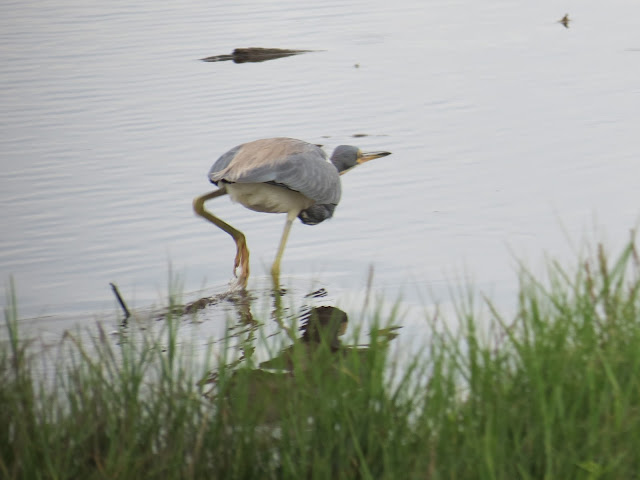And Spring was blooming out all over...
Birdie took me to several great birding centers,
and I was able to see many new-to-me birds. Be warned, this is a long one, so if you're sick of birding, better skip it.
See the bird on the sign? He was there; look for him.
Frontera had nice paths through thickets, interspersed with feeding stations.
Places to sit and watch. This is an Inca Dove (top) and White-tipped Dove. Orange-crowned Warbler
Chachalaca...the red on the throat means he's a breeding male. Chacalacas are highly vocal...you can hear them coming.
Isn't he beautiful? An Altamira Oriole
Boardwalk through the wetlands
This fox-tail squirrel liked the feeding stations too.
If you get tired of watching the birds, you can look at the bugs awhile.
They are colorful too.
We returned to Estero Llano State Park to do a trail we missed. These trees with yellow blooms are pretty. Mescat Wattle, I think it is called.
Birdie hiding behind a totem pole. Getting ready for Alaska. All these blooming plants are attracting the hummingbirds. This is Turk's Cap.
Never learned the name of this flowering tree. The hummers liked it.
First time I've seen a Rufous Hummingbird.
This Ruby-throated hummer is enjoying a feeder.Our next trip brought us through the town of San Benito, hometown of Freddy Fender....remember him? I didn't until I looked up his songs...I recognized them right away.
This was an amazing place for birds and other animals too.
There's a 15-mile driving loop that takes all day to do because of all the places to stop and look. We kept looking for the Ocelot, but no luck there.
We passed a family of Harris's Hawks on the entrance road.
At the feeding station near the Visitor's Center we got some good views of the Green Jays.And this Curve-billed Thrasher.
These two men are researchers from Sweden. We stopped them to ask what they were doing.
They're doing research on the interdependent relationship between the Yucca Moth and the Yucca plants.
This is a Caracara atop a Yucca bloom. The yucca moth is known for its co-dependant relationship with the yucca plant. The yucca moth’s larvae rely exclusively on the seeds of the yucca plant as a primary food source, and the plant relies exclusively on the yucca moth for pollination.
The Yucca Moth, emerging from her cocoon, flies to a Yucca flower and collects pollen from the stamens, holding a little ball of it in her mouth-parts. She then visits another flower and lays an egg in the seed-box. After this she applies the pollen to the tip of the pistil, thus securing the fertilization of the flower and the growth of the ovules in the pod.
Did we see the Yucca Moth? No, because it is secretive, and works only in the darkness between sunset and midnight.
We got out the binoculars to search this part-time wetland area.
And Birdie spotted these Willets in the distance.When we reached Laguna Bay we found a gazillion Redheads.
The sign said 80% of Redheads winter in this place. I believe it.
We can see South Padre Island from here.
Birdie got out her spotting scope and found me some Roseate Spoonbills. Too far away for a good picture though.This is a Reddish Egret, white morph. They sort of prance around to stir up the surf and look for food. fun to watch.
Later you'll see a dark morph.
We watched this Great Blue Heron catch this big fish and struggle with it a long time before he managed to swallow it.
The Osprey also had a nice catch.
Birdie setting up the scope.
On the way out we saw 3 coyotes in a field. Looked like mother & two juveniles.
And this guy alone in the road.
The next day we crossed the bridge to South Padre Island.
To visit the World Birding Center there.Poor Simba and Bandit!
The walkways bring you over the wetlands.
Long-billed curlew
Here he is, the Reddish Egret, dark morph.
Lots of Laughing Gulls
Pintail Ducks
Little Blue Heron
Merganzer
Tri-colored Heron
Blue-winged Teal
This turned out to be a Little-Blue having a bad hair day.
Common Moorhen
Popular tourist activities on South Padre Island.
This is gator habitat too.
My favorite bird of the day was the American Bittern. Can you see it?
There!
The Black Skimmers wouldn't fly when we wanted them to.
Widgeon
Unusual butterfly...looks inside-out.
Some more Spoonbills, with their backs turned. Still don't have a good pic.
Port Isabel Light
And the end of another great day.
But wait...there's more! The next day we went to Quinta Mazatlan.
The house and grounds are now part of the World Birding Center.
Constructed of 12 inch adobe block which were made on-site.
Entry
Some inside views.
Interesting trivia: The house was painted inside and outside with aluminum sulfate paint to prevent radar waves from penetrating the building.
This is called Cedar Hall. Legend has it that the ceiling beams are made of Lebanese cedar, a gift from the King of Lebanon to Mr. Matthews who fought alongside Lawrence of Arabia in the War of Independence from the Turks.
Now I know I need to quit eating those 3-2-1 cakes I've become addicted to.
A few noteworthy birds here: the Clay-colored Robin
And a Cooper's Hawk taking a bath.
Saw him again farther down the trail.
But mostly there were Chachalacas making so much racket you couldn't hear any other birds. Want to hear them? I'll leave you with them.
Simba is very happy we've moved on to places with dog-friendly hiking trails.


















































































